Ukraine-Russia war: Top US and Russian generals speak for first time since Putin’s invasion
Russian forces have reportedly claimed Mariupol following a three-month siege as America’s Joint Chiefs speak to their Russian counterparts first the first time since the invasion.
News
Don't miss out on the headlines from News. Followed categories will be added to My News.
Russia has claimed its forces have captured the key city of Mariupol following a three-month siege that is believed to have killed more than 20,000 civilians.
Russian Defence Minister Sergei Shoigu has reportedly informed Russian President Vladimir Putin of the “complete liberation” of the Azovstal steel plant, which was the last stronghold of Ukrainian resistance in the city. Russian media is also reporting that more than 2000 fighters holed up inside have surrendered this week – including 500 overnight.
However, this is yet to be confirmed by Ukrainian authorities
US AND RUSSIAN GENERALS HOLD PEACE TALKS
The news comes as top US General Mark Milley spoke with his Russian counterpart General Valery Gerasimov for the first time since Russian forces invaded Ukraine.
The Pentagon said that Milley, the chairman of the Joint Chiefs of Staff, and Gerasimov, chief of the Russian General Staff, “discussed several security-related issues of concern.”
According to a report by TV Zvezda, which is controlled by the Russian Defense Ministry, the call took place at the request of Milley and the two spoke about the situation in Ukraine.
The last time the two spoke by telephone was on February 11, when Washington was warning publicly of Russian plans to invade Ukraine and was hoping its warnings would discourage Moscow from moving ahead.

“They have not spoken since then until today,” said Commander Sean Riordan, a spokesman for the Joint Chiefs.
It came after US Defense Secretary Lloyd Austin and Russian Defense Minister Sergei Shoigu held their first discussions since the war began on 13 May
Austin urged the Russians to implement an “immediate ceasefire.” A Pentagon spokesman said later that the call “didn’t specifically solve any acute issues or lead to a direct change in what the Russians are doing or what they are saying.”
‘I APOLOGISE’: RUSSIAN SOLDIER STANDS TRIAL
A Russian soldier on trial for war crimes has apologised to a Ukrainian widow for murdering her husband, a Kyiv court heard.
The 21-year-old is the first soldier to stand trial for war crimes since Russian invaded Ukraine on February 24.
Vadim Shishimarin, a tank commander, pleaded guilty on Wednesday to killing Oleksandr Shelipov, an unarmed 62-year-old civilian, in the northeast Ukrainian village of Chupakhivka on 28 February.
“I acknowledge by blame... I ask you to forgive me,” he told widow, Kateryna Shalipova.
Prosecutors asked the judge to sentence Shishimarin to life in prison.
Shalipova told the court she would not object if Shishimarin was released to Russia as part of a prisoner swap, which would see the return of Ukrainian soldiers who had surrendered to Russia in Mariupol.
US SENATE APPROVES $40 BILLION AID BILL
With a huge bipartisan vote, the US Senate has approved Joe Biden’s military and humanitarian aid bill, which will see $40 billion go to Ukraine, as it approaches its fourth month of conflict.
The bill received 86 votes of support, with 11 Republicans complaining there were more pressing issues to deal with.
President Biden is expected to sign the bill as soon as possible amid warnings Ukraine would run out of aid in less than a week if Congress did not act.
All 50 Democrats supported the bill, which was larger than the original $33 billion bill Biden requested last month.
The president also announced another package of security assistance in the form of artillery, radars and other equipment.
RUSSIA FIRES SENIOR COMMANDERS AS UKRAINE SHELLS RUSSIAN TOWN
Russia has begun firing senior commanders over the military’s failure to make significant advances on Ukraine battlefield, according to intelligence officials.
The United Kingdom defence ministry’s latest intel update singled out the officers who failed to capture Kharkiv and were in command during the sinking of the Russian flagship, the Moskva, in the Black Sea.
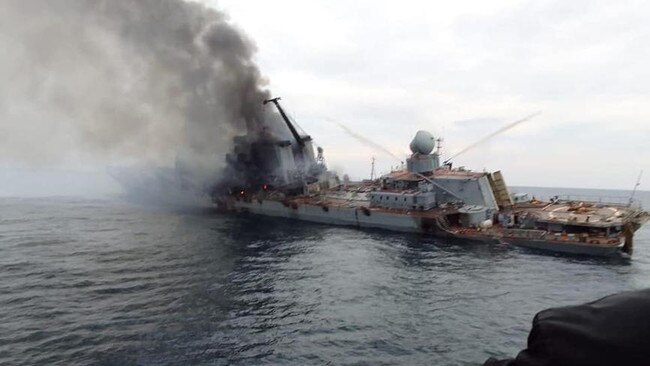
The ministry added that a “culture of cover-ups and scapegoating” was prevalent within the Russian military and security system as commanders sought to escape responsibility for failures during the conflict.
“Many officials involved in the invasion of Ukraine will likely be increasingly distracted by efforts to avoid personal culpability for Russia’s operational setbacks,” the ministry said in a statement.
“This will likely place a further strain on Russia’s centralised model of command and control, as officers increasingly seek to defer key decisions to their superiors. It will be difficult for Russia to regain the initiative under these conditions.”
Latest Defence Intelligence update on the situation in Ukraine - 19 May 2022
— Ministry of Defence 🇬🇧 (@DefenceHQ) May 19, 2022
Find out more about the UK government's response: https://t.co/qqKi2Uagzx
🇺🇦 #StandWithUkraine 🇺🇦 pic.twitter.com/1JYJHtSWRT
The major dismissals highlighted by the ministry include Lt. Gen. Serhiy Kisel, who commanded the 1st Guards Tank Army, and Vice Adm. Igor Osipov, who commanded Russia’s Black Sea Fleet.
British intelligence officers claim Kisel was likely suspended for his failure to capture Kharkiv. Osipov, meanwhile, was likely fired for the sinking of the cruiser Moskva in April.
UK intelligence also says it’s unclear whether the Chief of the General Staff, Valeriy Gerasimov, retains the confidence of Vladimir Putin, suggesting he could be the next to go if Russia fails to make significant progress.
UKRAINE ‘SHELLS’ RUSSIAN BORDER REGION
Kremlin officials claim the border region of Belgorod has been shelled as Ukraine advances closer to Russian territory.
Ukraine recently pushed Russian troops back to within 3 to 4 kilometres of the border in a counteroffensive near the outskirts of Kharkiv.
Officials in Belgorod, to the northeast of Kharkiv, claimed the Russian side of the border was shelled multiple times in the past week.
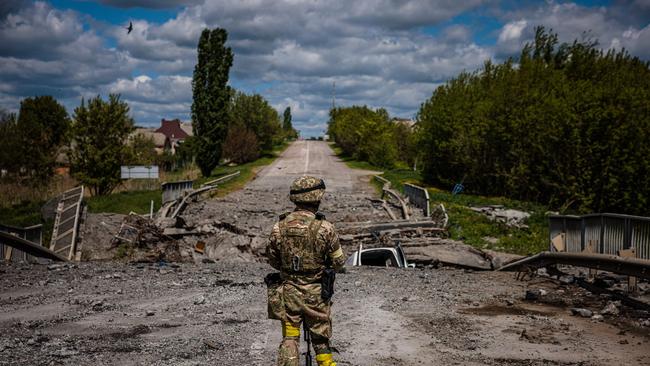
Belgorod governor Viacheslav Gladkov said one man was injured when the village of Solokhi, about 13km north of the nearest border, was shelled “from the Ukrainian side” over several days.
He added in a Telegram post that another person sustained a “slight injury” during the shelling of Bezimeno, again from the “Ukrainian side”.
Reports of attacks on Belgorod began in early April when an ammunition depot exploded and two helicopters struck an oil depot.
Editor of the Kremlin’s state broadcaster RT Margarita Simonyan, a reliable mouthpiece for Russian propaganda, said Russia would be justified in a nuclear response after the UK’s armed forces minister James Heappey said it was “completely legitimate” for Kyiv to attack targets across the border to disrupt logistics.
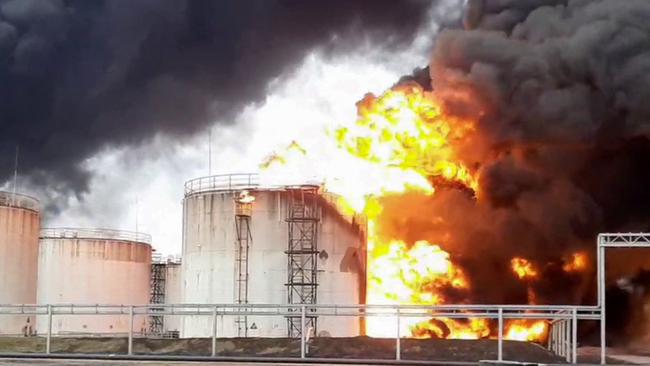
“What choice are you leaving us, idiots? Complete destruction of what remains of Ukraine? A nuclear strike?” Ms Simonyan said on her Telegram channel following the attacks.
“Explosions and aerial defence sirens in Belgorod,” she added. “The Anglo-Saxons are publicly calling on Ukraine to take the combat activity into Russian territory. And giving them the ammo to carry out that plan.”
RUSSIA UNLEASHES ‘TERMINATOR’
Russian President Vladimir Putin has deployed Russia’s “signature” armoured military vehicles around an Eastern Ukrainian city, as Kyiv destroys invading Russian tanks.
The deployment of the BMPT Terminator follows the continued obliteration of Russian’s main army tanks – the T-90M tank, by Ukrainian troops, with the help of British missiles.
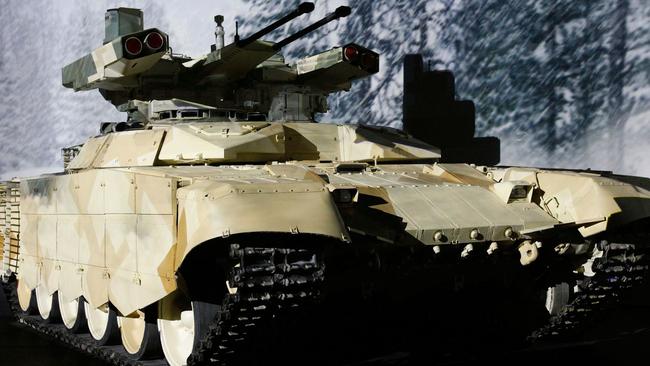
Earlier this week Ukraine reported its armed forces had destroyed Russian tanks deep behind enemy lines in the Donbas region using British-made Brimstone missiles.
This reportedly prompted the deployment of the BMPT-72, an armoured vehicle developed Russian machine company Uralvagonzavod and built on the chassis of the T-72 battle tank.
It can carry heavy force during any assault as well as increase the success of a tank operation.
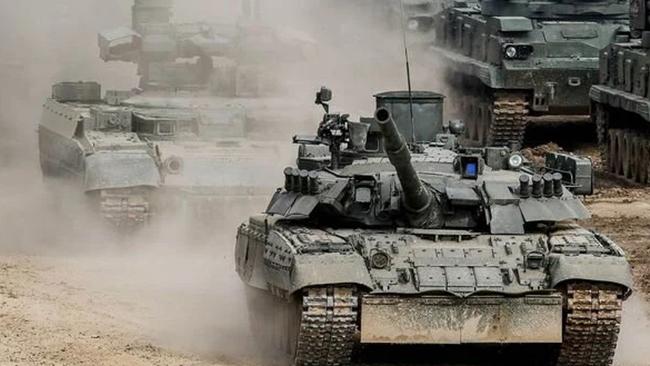
Veteran British army tank commander, Justin Crump told Sky News Russia was “quite proud” of the vehicle, which was used to support other tanks and “suppress” enemy fire when launching assaults in urban areas.
Mr Crump said Russia was reported to be bringing them in around Severodonetsk in Ukraine – showing its “determination to assault that city”.
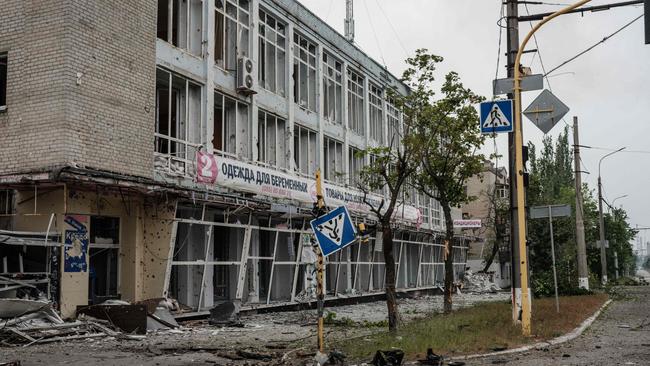
“This is a signature Russian piece of equipment. They’ve only got about nine of these,,” Mr Crump told Sky News.
“It’s nicknamed the Terminator – it’s a tank support vehicle. It’s designed to do the work of infantry in support of tanks. So it’s a tank with a turret designed to suppress enemy infantry.
“They haven’t committed them yet to the fight. It’s one of the things Russia is quite proud of – it’s what they’ve been trying to export.
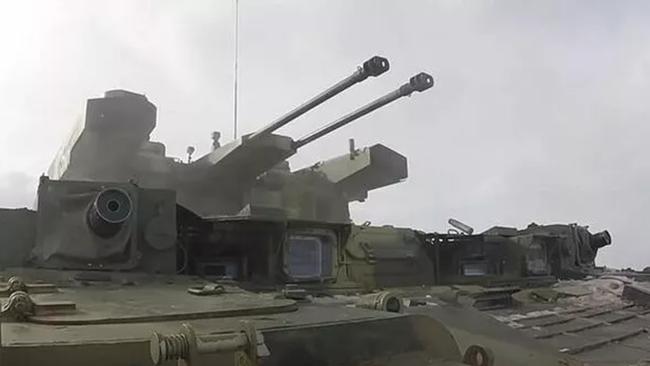
“They are now bringing them in around Severodonetsk. I think this shows Russia’s determination to assault that city sooner rather than later.
“By capturing this area around Severodonetsk, that allows them to have declared a success in freeing Luhansk.”
ZELENSKYY EXTENDS MILITARY CONSCRIPTION AND MARTIAL LAW
Ukrainian President Volodymyr Zelenskyy has submitted a bill to extend martial law and military conscription in Ukraine
Zelenskyy submitted the bill to the Ukrainian parliament, which proposes an extension of both by three months.
While the bill’s text has not been revealed, it is expected to receive parliamentary support, meaning both martial law and military conscription will continue until August 23 – the day before Ukrainian Independence Day.
Martial law was first imposed in response to Russia’s invasion of Ukraine on February 24. It’s twice been extended by 30 days, and is currently set to expire on May 25.
Previously, Ukraine’s defence minister Oleksiy Reznikov reportedly said he hoped to arm a million fighters as the country prepared for a “new, long phase of war.”
RUSSIA DEPLOYS LASER WEAPONRY
Russia announced that it has deployed a new generation of mysterious laser weaponry that can
destroy satellites in low Earth orbit.
As the US and NATO allies supply advanced weaponry to Ukraine, Vladimir Putin has reportedly stepped up Russia’s use of new technology after suffering major losses to a largely Soviet-era war machine.
Yury Borisov, the deputy prime minister in charge of military development, said in a state broadcast that the lasers were successfully burning up drones at distances of 5km, and “blinding” satellites up to 1,500 km above Earth.
Low Earth orbits up to 2,000 kilometres above sea level are often used for high-resolution imaging and communications. The distances claimed by Russia would put them in range of the International Space Station and the SpaceX Starlink satellites being used by Ukraine forces for communications.
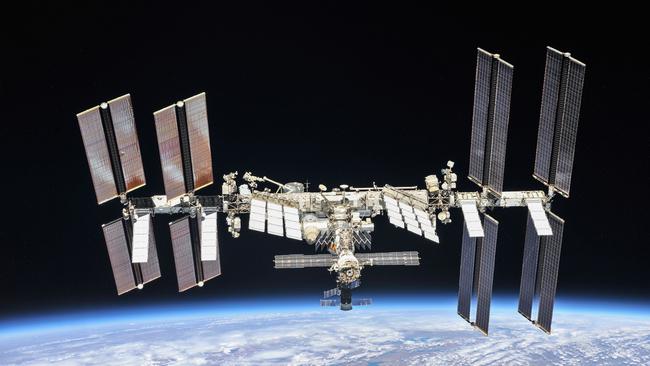
SpaceX CEO Elon Musk has already revealed that Russia was attacking his Starlink satellites through syber warfare, and the new laser weapons could be a new vector of attack against the low orbit internet communications.
“Starlink has resisted Russian cyberwar jamming & hacking attempts so far, but they’re ramping up their efforts,” he wrote on Twitter on May 10.
While little is known about the lasers, Mr Borisov named the Peresvet and the Zadira weapons system.
The Peresvet, named after a medieval Orthodox warrior monk who died in a duel to the death, “can blind all satellite reconnaissance systems of a likely enemy … disabling them during flight due to the use of laser radiation”, according to Mr Borisov.
It was among a series of lasers revealed in 2018 alongside new technology that included intercontinental ballistic missiles, underwater nuclear drones, and a supersonic weapon.
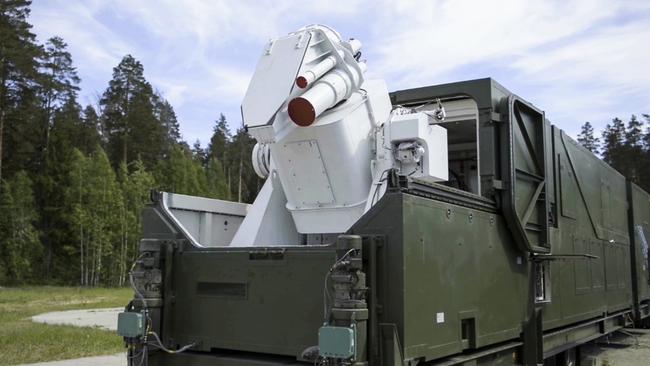
Mr Borisov said that the mobile laser technology is being mass-produced in Russia and supplied to its troops in Ukraine, adding that “unannounced successors” to the system are already in development.
Asked if the successors were already being used in Ukraine, he said, “yes”, the first “Zadira” prototypes were already being used in the country.
In 2017 Russian media said Russia’s state nuclear corporation, Rosatom, helped develop the Zadira, according to Reuters.
“If Peresvet blinds, then the new generation of laser weapons lead to the physical destruction of the target – thermal destruction, they burn up,” he said.
“This is primarily a laser weapon, an electromagnetic wideband weapon that will replace (conventional weapons) in the next decade – this is not some sort of exotic idea; it is the reality,” he added.
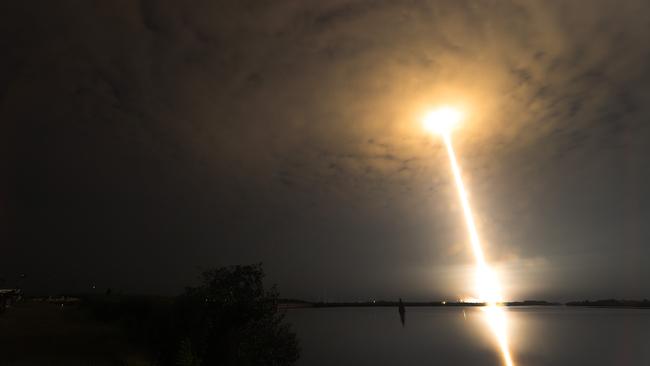
PUTIN ‘KILLED TWICE AS MANY CIVILIANS AS HITLER IN MARIUPOL’
Vladimir Putin has been accused of being responsible for twice as many deaths in the besieged city of Mariupol than Hitler.
Some 21,000 civilians have been slaughtered by Russian troops as they desperately tried to flee the relentless bombardment.
Mariupol’s embattled mayor, Vadym Boychenko, has warned thousands more of the city’s innocents could die within weeks as decomposing bodies begin poisoning water supplies.
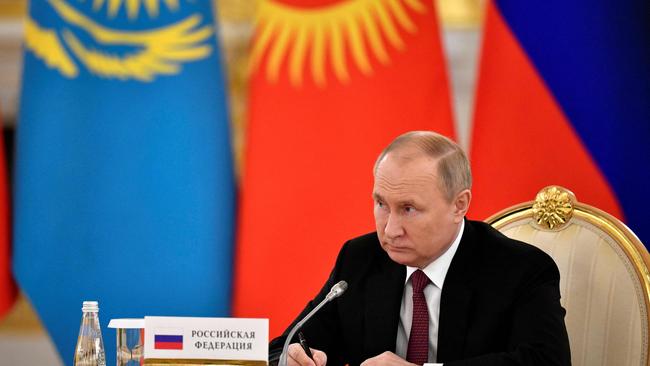
The leader also likened Putin to Adolf Hitler as he claimed the Russian tyrant is more evil than the Nazi dictator was and has more blood on his hands in Mariupol.
He told inews: “The evil created by Russia in Mariupol is even worse than Nazi Germany.
“In the Second World War, 10,000 people were killed in Mariupol in a two-year occupation. ”In two months of this blood-shedding war, Russia has killed more than 20,000. Putin is a bigger evil than Hitler and we must stop him.”
Under Hitler, around six million Jews were murdered in the Holocaust.
Amid their countless atrocities, around 160 concentration camps were set up across Ukraine and more than 1.3 million prisoners of war died at them.
Thousands of those killed were in Mariupol.
RUSSIAN POLITICIANS WANT SOLDIERS EXECUTED
Senior Russian politicians have backflipped on allowing hundreds of surrendered Mariupol fighters to be exchanged for Russian prisoners, with one arguing that they should be executed.
More than 250 fighters, who held Russian fighters at bay for two months, are to remain in Russian-controlled areas of Ukraine.
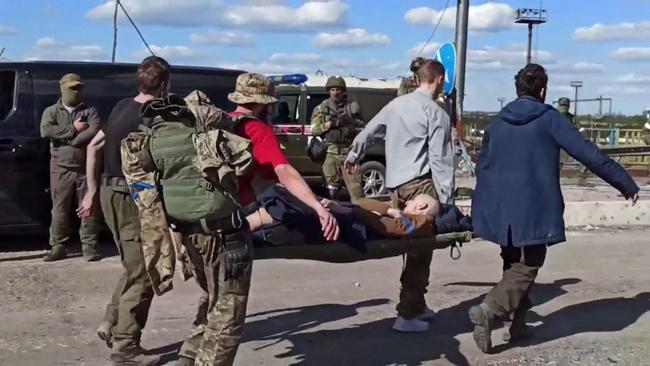
On Tuesday, the speaker of Russia’s State Duma ordered a standing order prohibiting the exchange of Azovstal troops for Russian prisoners of war.
“Nazi criminals should not be subject to exchange. They are war criminals and we must do everything to bring them to justice,” Speaker Vyacheslav Volodin said.
SIEGE OF MARIUPOL ENDS
After weeks of intense shelling and a desperate defence of Mariupol, the siege of the strategic port city has come to an end.
Both Russian and Ukraine officials announced that the fighting was over after the last 265 soldiers left the labyrinth of tunnels below the Asovstal steelworks.
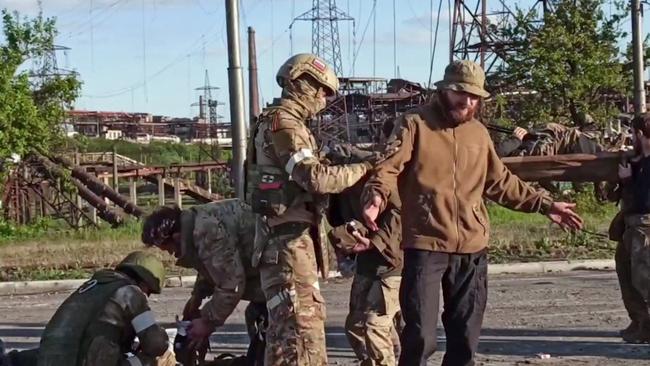
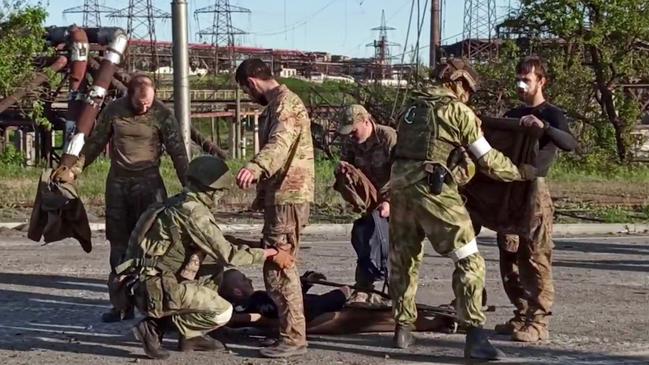
The Russian defence ministry said that Ukraine’s defenders, including 51 seriously wounded, “laid down their arms and surrendered”.
While Ukraine’s military command avoided using the term surrender, they said the mission to defend the Asovstal steel plant was over.
“Ukraine needs Ukrainian heroes alive,” President Volodymyr Zelenskyy said in his nightly video address.
“The work of bringing the boys home continues, and this work needs delicacy – and time,” he added.
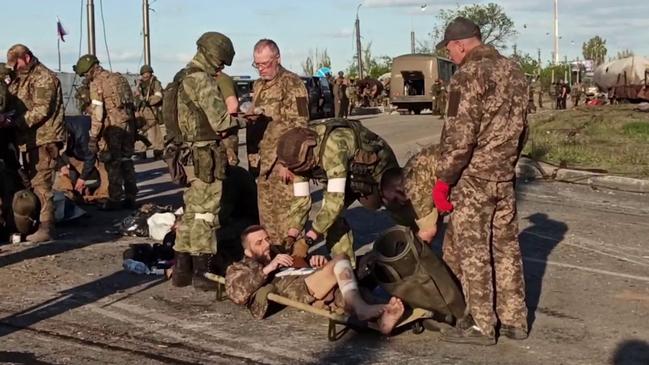
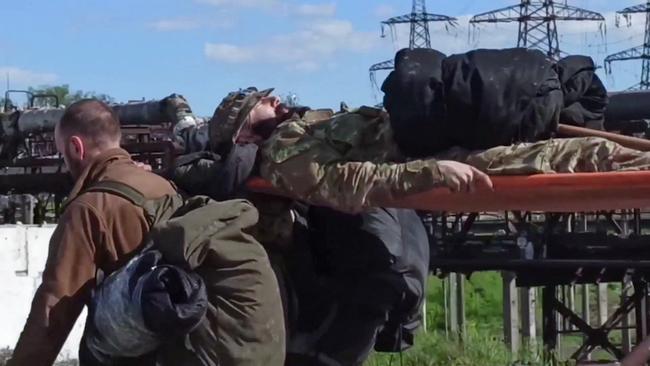
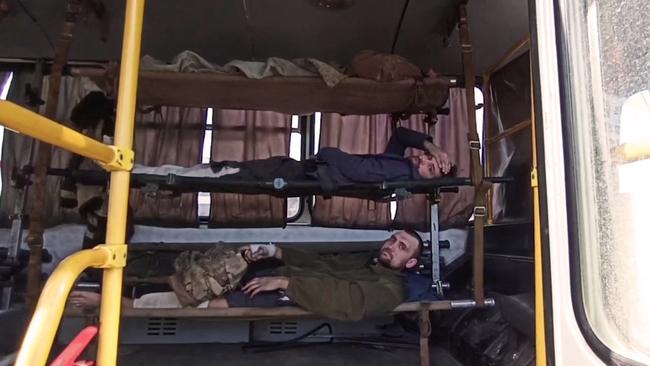
Kremlin spokesman Dmitry Peskov said the surrender came after Vladimir Putin guaranteed Ukrainian fighters would be treated “in accordance with international standards”.
The agreement reached on Mo
Images and video from the city showed wounded soldiers carried out of the plant, which Ukraine deputy defence minister, Hanna Malyar, said would be taken for medical treatment to Novoazovsk, in Russian-controlled territory east of Mariupol.
The remaining fighters were being taken to Olenikva, north of Mariupol, to be exchanged for Russian prisoners of war.
Vyacheslav Volodin, speaker of Russia’s lower house, State Duma, said Ukraine fighters were “Nazi criminals” who should not be included in prisoner exchanges, according to news agency TASS.
One of Moscow’s negotiators, Leonid Slutsky, called the evacuated Azov fighters “animals in human form” and said they should receive the death penalty.
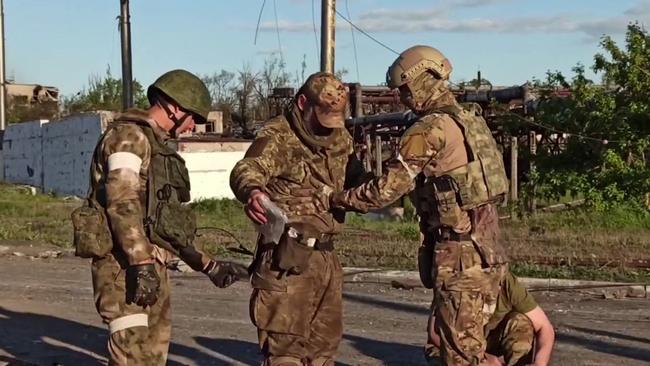
RUSSIA MOVES MISSILES NEAR FINNISH BORDER
Russia has wasted no time in taking action after Finland and Sweden announced they would apply for NATO membership.
Moscow has reportedly deployed seven Iskander missiles close to Finland’s border.
Dashcam footage shows the Iskanders on a highway leading to Vyborg, a Russian town close to the Finnish border.
A person inside the vehicle said: “As soon as the president of Finland said they were joining NATO, a whole division of Iskanders, seven of them … is moving towards Vyborg.
“Looks like a new military unit is about to be formed in Vyborg or the region.
“All the equipment is new, Ural trucks are driving it. So, get ready Finns, to join NATO.
“New Urals, seven Iskanders, looks like a new military unit is being formed – well done.”
The missiles have a range of up to 500km and can be fitted with a number of warheads including thermobaric bombs, cluster munitions, and nuclear weapons.
Reportedly, #Russia is moving 9K70 Iskander SBRM systems to the border with #Finland. How on earth the Kremlin calculates to intimidate Helsinki with this move?! pic.twitter.com/qgLWyi2IPh
— Giorgi Revishvili (@revishvilig) May 16, 2022
UKRAINE REACHES RUSSIAN BORDER IN COUNTER-ATTACK
Ukraine says it has pushed Russian troops back to the border in a counteroffensive near the outskirts of Kharkiv.
US defence officials confirmed reports that Ukraine had regained control of territory, adding that Russian troops were pushed to within 3 to 4 kilometres of the border.
It came as Moscow warned of “far-reaching consequences” if Finland and Sweden join the NATO military alliance.
Ukraine’s interior ministry adviser Vadym Denisenko said their counteroffensive “can no longer be stopped”, according to Reuters.
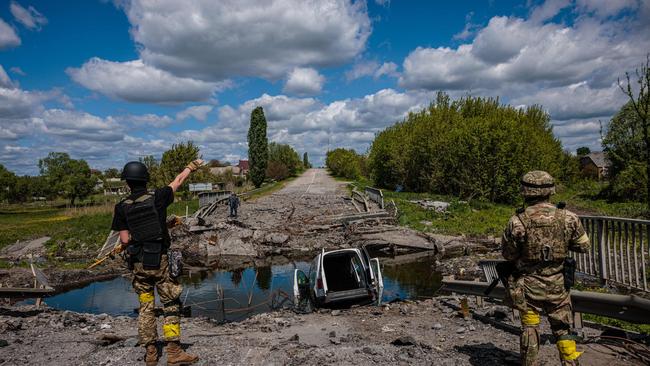
The defence ministry said the Ukrainian troops of the 127th brigade in the Kharkiv region “drove out the Russians and claimed the state border”.
Images showed the “Kraken” special forces unit near the Russian border on the road to the village of Rus’ka Lozova.
In a video released with the statement, a clutch of Ukrainian soldiers in camouflage and holding weapons are gathered around a yellow-and-blue-painted border demarcation post and address President Volodymyr Zelensky.
The military has “reached the border with the Russian Federation – with the occupying country – we’ve done it; we’re here,” one of the soldiers says.
Ukraine presidential adviser Oleksiy Arestovich on Sunday told local television that Russian troops were being redeployed towards the Donbas region south of Kharkiv after withdrawing, following a Ukrainian counteroffensive.
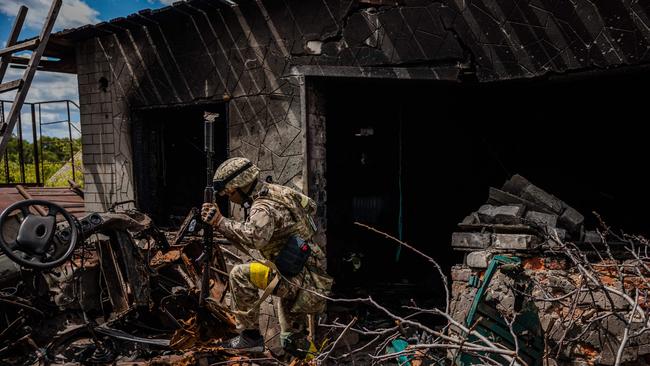
Since failing to take the capital at the beginning of the invasion in late February, control of Donbas has become one of Moscow’s primary objectives – but Western intelligence has predicted its campaign will stall amid heavy losses and fierce resistance.
“We thank everyone who, risking their lives, liberates Ukraine from Russian invaders,” Kharkiv regional governor Oleg Synegubov said in a statement on social media.
“We still have a lot of work ahead of us,” he added.
The Ukraine presidency said in a briefing Monday that Russia had continued strikes on the Lugansk region south of Kharkiv.
“Two people were killed and nine were wounded, including a child, as a result of shelling on a Severodonetsk hospital,” it said, referring to a major urban hub.
Separately, police in the neighbouring Donetsk region reported that six civilians were killed and 12 wounded in Russian shelling that hit 10 settlements in the area over the past 24 hours.
“Thirty-six civilian facilities were destroyed, including residential buildings, a mosque, a factory, a cafe,” it said on Telegram.
In the western city of Lviv, city authorities said official infrastructure had been hit on May 13 by a cyberattack and that the Ukrainian SBU security services were working to limit the fallout.
NATO BID ‘WILL PROVOKE’ RUSSIA
Russia’s President Vladimir Putin has warned that while Russia does not see Finland and Sweden’s decision to join NATO as a threat, deployment of military infrastructure there may trigger a response from Moscow.
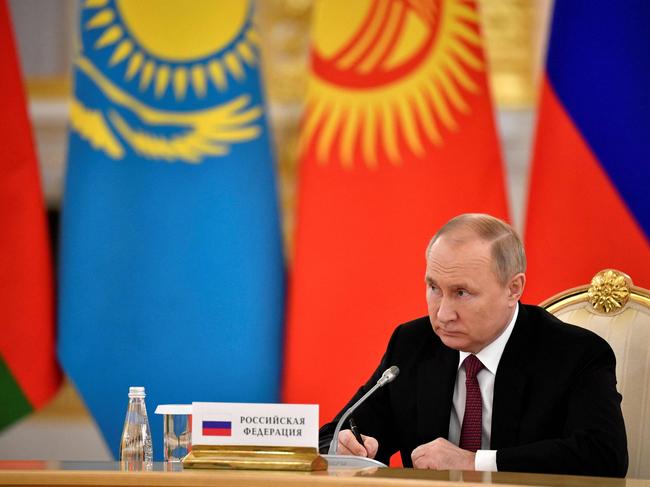
The expansion of NATO to Sweden and Finland poses “no direct threat for us … but the expansion of military infrastructure to these territories will certainly provoke our response,” Mr Putin said during a televised summit meeting of the Collective Security Treaty Organisation, a Moscow-led military alliance.
Russia warned Finland and Sweden Monday they were making a “grave mistake” in their moves to join NATO as Ukraine braced for a new push by Moscow’s forces in its eastern Donbas region.
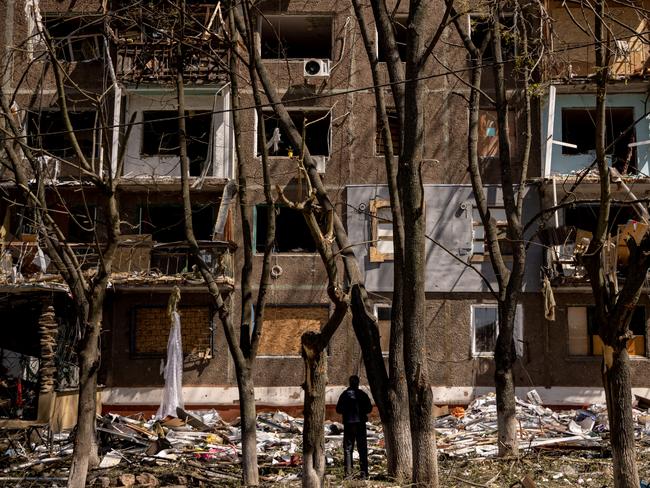
“This is another grave mistake with far-reaching consequences,” Deputy Foreign Minister Sergei Ryabkov told reporters Monday, warning “the general level of military tensions will increase”.
“They should have no illusions that we will just put up with this,” he was quoted as saying by Russian news agencies.
Russia has already suspended electricity supplies to Finland, citing payment issues.
But Finnish Prime Minister Sanna Marin told lawmakers: “Our security environment has fundamentally changed.
“The only country that threatens European security, and is now openly waging a war of aggression, is Russia.”
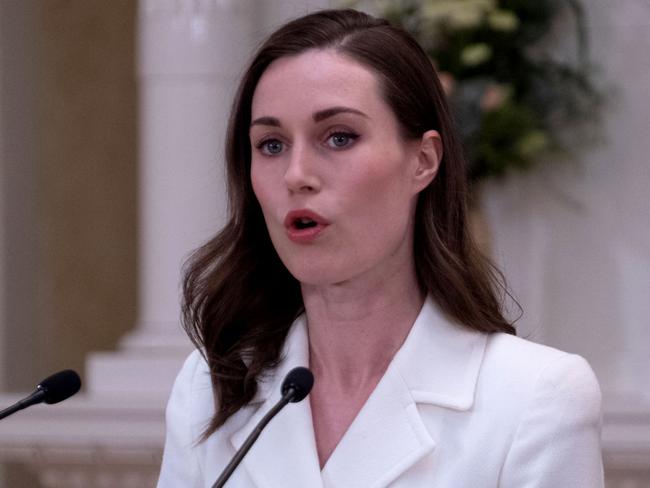
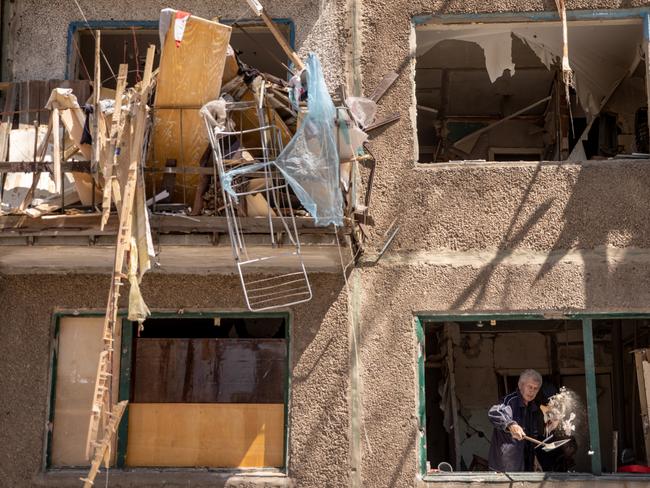
Since failing to take the capital Kyiv in the early weeks of the war, Moscow has focused on the eastern industrial region of Donbas, near the Russian border and home to pro-Russian separatists.
“We are preparing for new attempts by Russia to attack in Donbas, to somehow intensify its movement in the south of Ukraine,” President Volodymyr Zelensky said in his nightly address Sunday.
It comes as Ukraine can defeat Russia’s invasion, NATO chief Jens Stoltenberg said Sunday, urging the alliance to keep sending military aid to Kyiv.
“Ukraine can win this war. Ukrainians are bravely defending their homeland,” said Mr Stoltenberg, adding that “we must continue to step up and sustain our … support to Ukraine”.
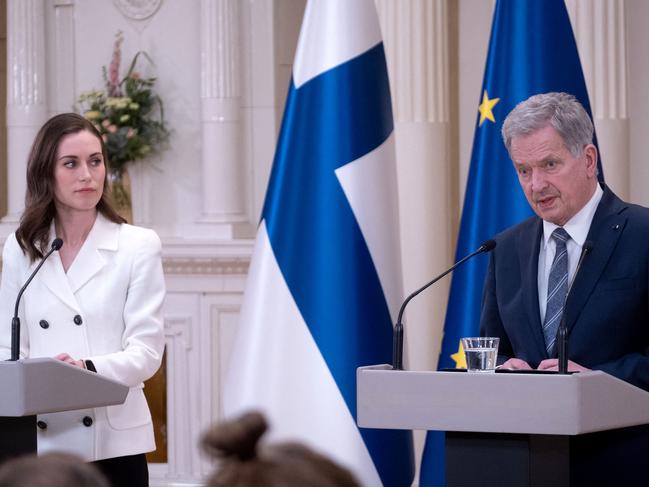
It comes as Sweden’s ruling party said it was in favour of joining NATO just hours after Finland’s announcement, in a remarkable turnaround in political and public opinion following Russia’s invasion of Ukraine.
“The best thing for Sweden’s security is that we apply for membership now, and that we do it with Finland,” Social Democratic Prime Minister Magdalena Andersson said.
Finland’s President Sauli Niinisto said “a new era is opening”.
“Today, the President of the Republic and the Government’s Foreign Policy Committee have jointly agreed that Finland will apply for NATO membership, after consulting parliament. This is a historic day,” he said.
“We have reached today an important decision in good co-operation with the government and the president of the republic. We hope the parliament will confirm the decision to apply for the NATO membership during the coming days. It will be based on a strong mandate”, Prime Minister Sanna Marin said.
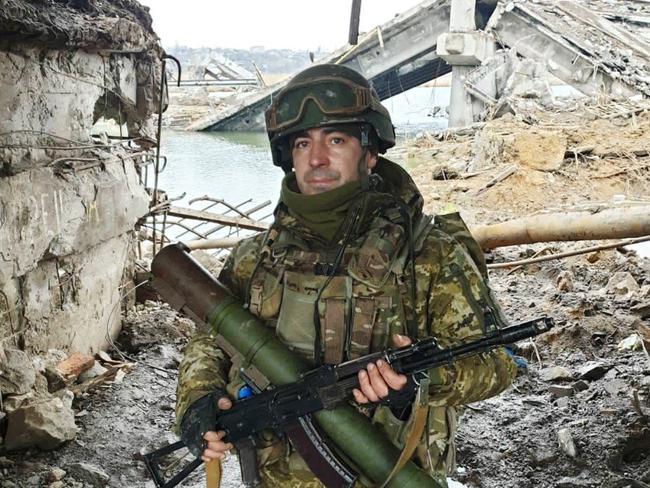
Sharing a 1300km border with Russia, Finland has remained militarily non-aligned for 75 years.
But after its powerful eastern neighbour invaded Ukraine in February, political and public opinion swung dramatically in favour of membership, with the Finnish president and prime minister on Thursday calling for the country to join NATO “without delay”.
Russia has repeatedly warned of consequences if Helsinki joins the alliance.
Earlier this week, Mr Niinisto told reporters that “joining NATO would not be against anyone.”
He said his response to Russia would be: “You caused this. Look in the mirror.”
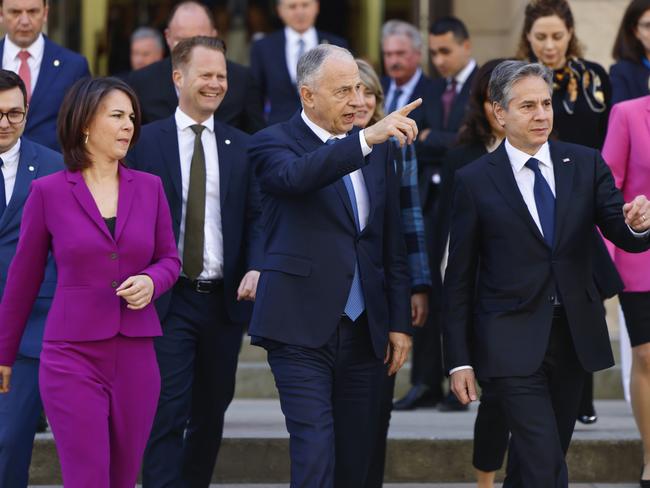
NATO countries are ready to provide military assistance to Ukraine to help it repel Russia’s invasion for as long as it is needed, German Foreign Minister Annalena Baerbock said on Sunday.
“We agree that we must not and will not let up in our national efforts, especially in terms of military support, for as long as Ukraine needs this support for the self-defence of its country,” Baerbock said at a NATO meeting in Berlin.
Ukraine’s foreign minister Dmytro Kuleba praised Germany on Sunday for delivering heavy weapons to Kyiv.
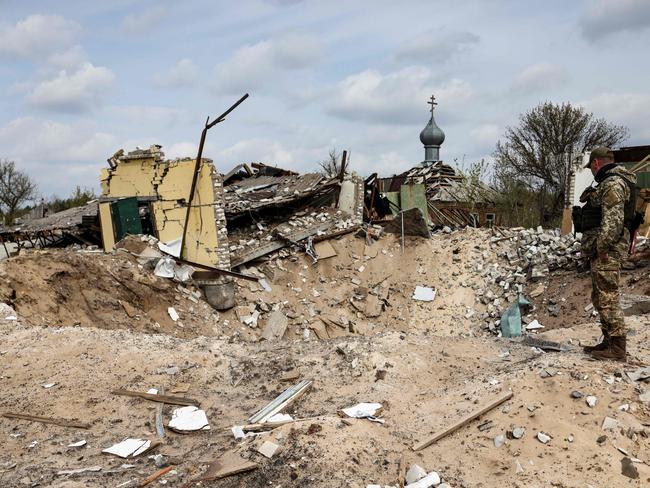
“A precedent has been set. The first psychological barrier (on handing weapons to Ukraine) has been overcome,” Kuleba said in a video on Facebook while on a visit to Berlin.
After previously limiting deliveries to defensive weapons, Berlin is ramping up shipments of heavy arms to Ukraine, sending German self-propelled howitzers to Kyiv.
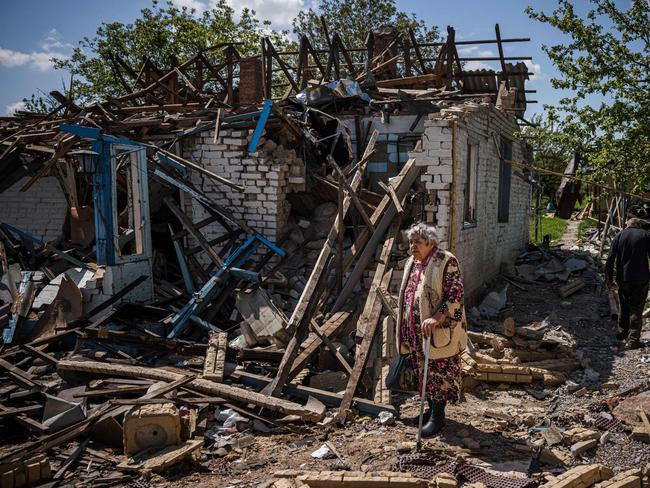
Mr Kuleba said Germany had hosted training for Ukrainian soldiers on how to use the artillery.
“This is an extremely important moment for our relations, because it will be the first heavy weapons that Germany will hand over to Ukraine soon,” he said.
Germany said it would send seven Pazerhaubitze 2000s (armoured howitzer 2000) to Ukraine last week, which Mr Kuleba said would be used to “smash the enemy.”
He had discussed what other weapons could be given to Kyiv, but “the final decision is still up to the Germans,” Mr Kuleba said.
Mr Kuleba also discussed more weapon deliveries to Ukraine with US Secretary of State Antony Blinken in the German capital.
“More weapons and other aid is on the way to Ukraine,” he said on Twitter, posting a photograph of his meeting with the US official.
Ukraine’s top diplomat also said Germany had made a “political decision” to end its energy reliance on Moscow.
“My impression is that the fundamental political decision that Germany’s dependence on Russian gas is a huge problem and that this dependence must end, such a decision has been made,” he said.




